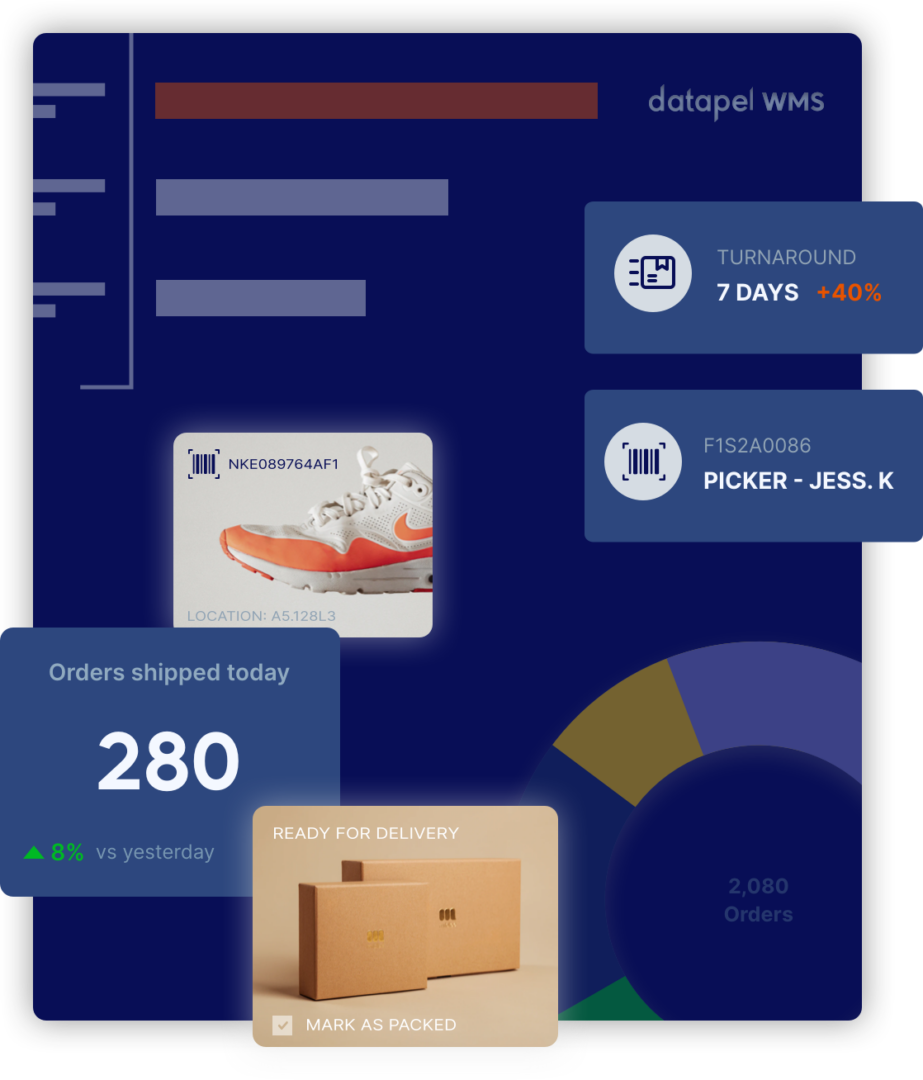Streamlining Your eCommerce Integration: Connect Datapel Cloud.WMS with Your Online Store
Contents
In today’s fast-paced digital landscape, seamless integration between your eCommerce platform and Inventory Management System is essential to maintain a competitive edge and provide a smooth customer experience. Datapel, as a leading Warehouse Management System (WMS) provider, offers a powerful solution to align your eCommerce and Inventory Management processes, empowering your business to thrive.
In this article, we’ll explore the reasons and benefits of a Datapel Cloud.WMS eCommerce integration, the steps involved in the integration process, and the potential advanced features you can leverage.
Benefits of eCommerce Integration

Enhanced Efficiency
An eCommerce integration with Datapel Cloud.WMS streamlines your operations, minimising manual data entry and reducing the risk of errors. This increased efficiency results in faster order processing and quicker delivery times, leading to improved customer satisfaction.
Real-Time Inventory Visibility
Maintaining accurate inventory levels across multiple sales channels is crucial for preventing overselling and stockouts. The integration ensures that your eCommerce store always reflects the most up-to-date stock information from Datapel Cloud.WMS, providing customers with accurate product availability.
Centralised Order Management
With the eCommerce integration, all eCommerce orders flow directly into Datapel Cloud.WMS, allows you to manage and fulfil them from a single platform. This centralisation simplifies order tracking, inventory allocation, and shipping, reducing complexities in your fulfilment process.
Better Customer Experience
An integrated system allows you to offer real-time order tracking, automated notifications, and timely updates to your customers. This transparency leads to increased trust and loyalty, enhancing the overall shopping experience.
eCommerce Integration Guide

At Datapel, we understand the importance of seamless warehouse operations for your business’s success. eCommerce integration with our Warehouse Management System (WMS) is a strategic step towards enhancing efficiency, optimising inventory management, and delivering exceptional customer experiences.
Let’s walk through the process of setting up eCommerce integration with Datapel Cloud.WMS, outlining the steps involved and setting realistic expectations to ensure a smooth and successful implementation.
Step 1: Evaluation and Planning
Before embarking on the integration journey, our team will collaborate with you to understand your business requirements and goals. This initial phase involves a thorough evaluation of your existing eCommerce and warehouse operations, identifying pain points and opportunities for improvement. Together, we will establish clear objectives and define the functionalities you wish to achieve through the integration.
Step 2: Integration Consultation and Solution Selection
Based on the insights gained from the evaluation, our knowledgeable team will recommend the most suitable eCommerce integration solution for your specific needs. Whether you operate on popular platforms like Shopify, WooCommerce, Magento, or others, we offer flexible integration options to cater to your business’s unique ecosystem.
Step 3: Data Mapping and Configuration
As we proceed to the implementation stage, data mapping and configuration become pivotal. Our experienced team will work closely with you to map the relevant data fields between your eCommerce platform and Datapel Cloud.WMS. This process ensures seamless information exchange, including product details, orders, pricing, and inventory levels, enabling real-time data synchronisation.
Data Mapping Basics:
Data mapping is the process of defining how information flows between your eCommerce platform and WMS. It involves mapping data fields, such as SKU, product description, quantity, and customer information, ensuring that they align properly in both systems.
Aligning Your eCommerce and Inventory Management System:
- Centralised Data Repository: eCommerce integration with WMS ensures that all data, including product details, customer information, and order history, is consolidated into a central repository. This eliminates data silos, fostering better collaboration and decision-making.
- Data Integrity: To ensure seamless integration, it is essential to maintain data accuracy and consistency between your eCommerce platform and WMS. Regular data audits and validations are vital to prevent discrepancies that could lead to inventory mismanagement and fulfilment errors.
Step 4: Rigorous Testing and Quality Assurance
Our commitment to delivering a robust and reliable integration experience drives us to conduct rigorous testing and quality assurance. Before the integration goes live, we execute comprehensive test scenarios, identifying and addressing any potential issues to ensure a glitch-free implementation.
Step 5: Smooth Deployment and Training
With a meticulous plan in place, we proceed to deploy the integrated solution. Our experts work diligently to ensure a smooth and efficient implementation, minimising disruptions to your daily operations. To empower your team to make the most of the new system, we provide comprehensive training sessions and ongoing support to address any questions or challenges that may arise.
Step 6: Monitoring and Continuous Improvement
Our commitment does not end with deployment. Post-implementation, our team monitors the integration’s performance closely to ensure it meets your business objectives and delivers the desired outcomes. Continuous improvement is at the heart of our approach, and we actively seek feedback from your team to make any necessary refinements and adaptations.
Advanced Integration Features:
In addition to basic integration, you can explore advanced features such as:
- Pricing, Shipping Methods, Status, and Consignment Numbers Integration: Automate the synchronisation of pricing, shipping options, order status, and tracking information between the systems.
- Payments Integration: Seamlessly connect payment gateways to facilitate secure and efficient transactions.
- Returns Management and eCommerce: Streamline the returns process by integrating returns data between your eCommerce store and Datapel Cloud.WMS.
- Loyalty/Discount Systems Integration: Enhance customer loyalty by integrating loyalty and discount programs with your eCommerce platform.
- Bundles and Kits Integration: Simplify the management of bundled products and kits by synchronising them across both systems.
Importance of Security in eCommerce-WMS Integration

eCommerce integration with your Warehouse Management System facilitates the seamless exchange of crucial data between systems, including customer details, order information, and inventory levels. However, this interconnectedness also presents potential security vulnerabilities. Unprotected data during integration could expose your business to significant risks, such as:
- Data Breaches: Unauthorised access to customer information and sensitive business data can lead to severe financial losses and reputational damage.
- Cyber Attacks: The interconnected nature of integrated systems creates entry points for cybercriminals to launch attacks, compromising your business’s operations and credibility.
- Intellectual Property Theft: Critical business intelligence and proprietary information may become susceptible to theft, impacting your competitive edge.
Datapel Cloud.WMS: A Fortress of Security
At Datapel, we take data security with the utmost seriousness. Our Cloud.WMS solution is built with robust security features to fortify your eCommerce-WMS integration, safeguarding your valuable data throughout the process.
- Encrypted Data Transmission: Data transmission between your eCommerce platform and Cloud.WMS occurs through encrypted channels, ensuring that information remains secure during transit.
- Secure API Integrations: Our API integrations utilise industry-leading security protocols, minimising the risk of unauthorised access and ensuring data integrity during the integration process.
- Role-Based Access Control: Datapel Cloud.WMS implements strict role-based access control mechanisms, granting appropriate privileges to authorised personnel only, reducing the risk of internal breaches.
- Regular Security Audits: We conduct comprehensive security audits and assessments to identify vulnerabilities and address potential threats, keeping our system fortified against emerging risks.
- Continuous Monitoring and Threat Detection: Our team continually monitors the Cloud.WMS environment, proactively detecting and mitigating any suspicious activities to maintain a secure ecosystem.
- Data Encryption at Rest: All data stored within Cloud.WMS is encrypted at rest, providing an additional layer of protection against unauthorised access.
Case Study: ELK Accessories

When ELK turned to online e-tailing, they required a WMS that could keep up with next-day delivery of online orders. Their Datapel WMS integrated with Shopify to process orders in real time, even reflecting consignment and shipping status back to their eCommerce site.
Challenges and issues
As a leading fashion and accessories brand supplying domestic and overseas stores, ELK identified a growing online e-tailing opportunity. They required a WMS that could keep up with the fast—often next day—delivery of online orders direct from their Melbourne warehouse.
Solution and implementation
With Datapel Cloud.WMS and Shopify integration, orders are transferred and allocated in real time to the warehouse for fulfilment. Consignment and shipping status reflecting back to the e-commerce site on order despatch giving customers full visibility into the supply-chain process.
Start with the Basics, then Increase Integration Complexity:
Embarking on the integration journey with Datapel Cloud.WMS and your eCommerce store is a prudent step for business growth. Begin with the fundamentals and gradually explore advanced features to optimise your operations and elevate the customer experience.
By leveraging Datapel’s powerful WMS capabilities and a well-integrated eCommerce platform, you can stay ahead in today’s competitive digital marketplace. Book a call with our team today!

In my role, I oversee the development of insightful blogs that delve into the intricacies of warehouse management. Each piece reflects my dedication to empowering businesses through informative content. Through my team’s extensive experience in the industry, we aim to bring clarity to the complexities of WMS, helping businesses make informed decisions.
Join me on a journey through the ever-evolving landscape of warehouse technology as we explore the latest trends, industry insights, and practical tips to streamline your operations. Feel free to connect, and let’s embark on a collaborative exploration of how WMS can redefine your business efficiency.
Cheers to innovation, efficiency, and the exciting world of warehouse management!







